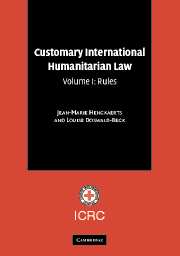Book contents
- Frontmatter
- Contents
- Foreword by ICRC President Jakob Kellenberger
- Foreword by Judge Abdul G. Koroma
- Foreword by Yves Sandoz
- Acknowledgements
- Introduction
- List of abbreviations
- Part I The Principle of Distinction
- Part II Specifically Protected Persons and Objects
- Part III Specific Methods of Warfare
- Part IV Weapons
- Part V Treatment of Civilians and Persons Hors De Combat
- Chapter 32 Fundamental Guarantees (Rules 87–105)
- Chapter 33 Combatants and Prisoner-of-War Status (Rules 106–108)
- Chapter 34 The Wounded, Sick and Shipwrecked (Rules 109–111)
- Chapter 35 The Dead (Rules 112–116)
- Chapter 36 Missing Persons (Rule 117)
- Chapter 37 Persons Deprived of Their Liberty (Rules 118–128)
- Chapter 38 Displacement and Displaced Persons (Rules 129–133)
- Chapter 39 Other Persons Afforded Specific Protection (Rules 134–138)
- Part VI Implementation
Chapter 37 - Persons Deprived of Their Liberty (Rules 118–128)
Published online by Cambridge University Press: 05 June 2012
- Frontmatter
- Contents
- Foreword by ICRC President Jakob Kellenberger
- Foreword by Judge Abdul G. Koroma
- Foreword by Yves Sandoz
- Acknowledgements
- Introduction
- List of abbreviations
- Part I The Principle of Distinction
- Part II Specifically Protected Persons and Objects
- Part III Specific Methods of Warfare
- Part IV Weapons
- Part V Treatment of Civilians and Persons Hors De Combat
- Chapter 32 Fundamental Guarantees (Rules 87–105)
- Chapter 33 Combatants and Prisoner-of-War Status (Rules 106–108)
- Chapter 34 The Wounded, Sick and Shipwrecked (Rules 109–111)
- Chapter 35 The Dead (Rules 112–116)
- Chapter 36 Missing Persons (Rule 117)
- Chapter 37 Persons Deprived of Their Liberty (Rules 118–128)
- Chapter 38 Displacement and Displaced Persons (Rules 129–133)
- Chapter 39 Other Persons Afforded Specific Protection (Rules 134–138)
- Part VI Implementation
Summary
Note: This chapter addresses the treatment of persons deprived of their liberty for reasons related to armed conflict, whether international or non-international. With regard to international armed conflicts, this term includes combatants who have fallen into the hands of the adverse party, civilian internees and security detainees. With regard to non-international armed conflicts, it includes persons who have taken a direct part in hostilities and who have fallen into the power of the adverse party, as well as those detained on criminal charges or for security reasons, provided that a link exists between the situation of armed conflict and the deprivation of liberty. The term “detainees” as used in this chapter covers all persons thus deprived of their liberty.
Rule 118. Persons deprived of their liberty must be provided with adequate food, water, clothing, shelter and medical attention.
Practice
Volume II, Chapter 37, Section A.
Summary
State practice establishes this rule as a norm of customary international law applicable in both international and non-international armed conflicts.
International armed conflicts
The rule according to which prisoners of war must be provided with adequate food and clothing is a long-standing rule of customary international law already recognised in the Lieber Code, the Brussels Declaration and the Oxford Manual. It was codified in the Hague Regulations and is now dealt with in detail by the Third Geneva Convention. Under the Fourth Geneva Convention, this rule is also applicable to civilians deprived of their liberty in connection with an international armed conflict.
- Type
- Chapter
- Information
- Customary International Humanitarian Law , pp. 428 - 456Publisher: Cambridge University PressPrint publication year: 2005



